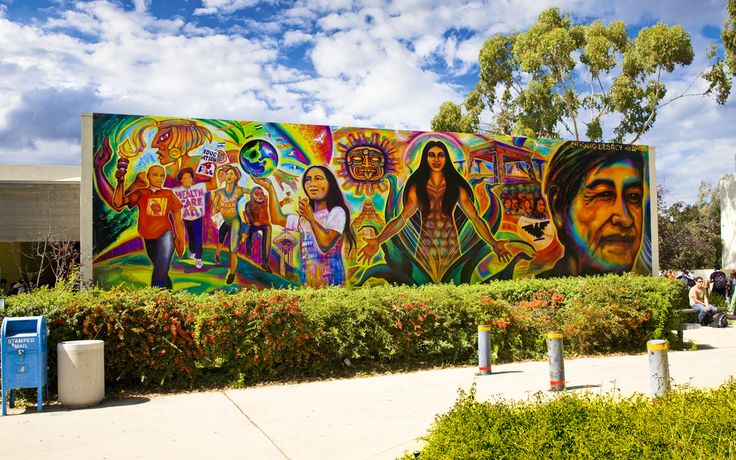DOC Program Values and Beliefs
 [UCSD's Chicano Legacy Mural at Peterson Hall]
[UCSD's Chicano Legacy Mural at Peterson Hall]
As a program, DOC works to create the conditions for all in our learning community to ask challenging questions and seek their own answers. In the original demands for our College, a cross-racial coalition of student activists demanded a college “devoted to relevant education for minority youth and to the study of the contemporary social problems of all people;” they wanted a college where they could “subject every part of the system to ruthless criticism” (BSC-MAYA, 1969, p. 2). To honor these demands, DOC’s mission is to help students develop their critical reading, writing, and thinking skills by exploring the painful history of racial and social differences in the United States. DOC instructors are not here to indoctrinate students into a specific political ideology; rather, DOC instructors labor to create classroom spaces where students of different identities, positionalities, and lived experiences can practice their reading, writing, and thinking skills by considering the challenges of achieving justice and liberation for all.
DOC centers the following values and beliefs to ensure that it constantly navigates in consistently ethical and student-centered ways the contradictions between the founding of the college and its mandated role in the institution of UCSD:
- First, the teaching of writing must be as a process, emphasizing practice.
- To expect students to produce “perfect” papers in isolation is not only unreasonable, but disregards the structural barriers students face to learning and deploying expectations of academic English that have been shaped by inequitable systems of race, class, gender, sexuality, ability, and citizenship. DOC is defined by the teaching of writing as a process and in community with others; the role of our instructors is to guide and mentor students in the practice of their academic writing as one method of communication that is legitimized by the university. It is a privileged method of expression that the DOC program seeks to demystify and enable student access to in order to transform the university from within.
- Second, the practice of scholarship is to engage in interdisciplinary conversation.
- DOC recognizes that there is no single discipline or way of knowing the world that is inherently superior to another. DOC curriculum touches on the social sciences, humanities, and STEM-based principles of analysis in order to enable our students to enter multiple academic and scholarly conversations that are necessary for in-depth engagement with significant questions regarding human society, culture, and history.
- Third, social power and position must be analyzed through an intersectional framework.
- In keeping with the founding student demands for Marshall College, DOC curriculum is grounded in intersectional frameworks of social analysis to help students understand the complexities and contradictions of power and privilege. In DOC, students investigate how multiple categories of social hierarchies intersect to impact individual experiences, life possibilities, and social positions. DOC curriculum guides students in going beyond an either/or understanding of oppression to see how every single individual is both empowered and disempowered depending on specific socio-historical moments and changing personal circumstances. In this way, DOC works to help students understand the necessity of deep relationship building across differences to form coalitions that work together for justice for all.
- Fourth, DOC students are knowledge producers and agents of change.
- DOC seeks to empower students in their learning as active producers of knowledge, contributing to scholarly conversations in ways shaped by their lived experiences and the cultural wealth of the communities from which they come. Students are not just consumers in DOC classrooms, but affect the university by their very presence and determine the learning environment by their active engagement. The ultimate goal of DOC’s pedagogy is to foster communities of learning so that students can take action from the bottom up to impact society in the name of collective liberation.
For further reference:
 [UCSD's Chicano Legacy Mural at Peterson Hall]
[UCSD's Chicano Legacy Mural at Peterson Hall]